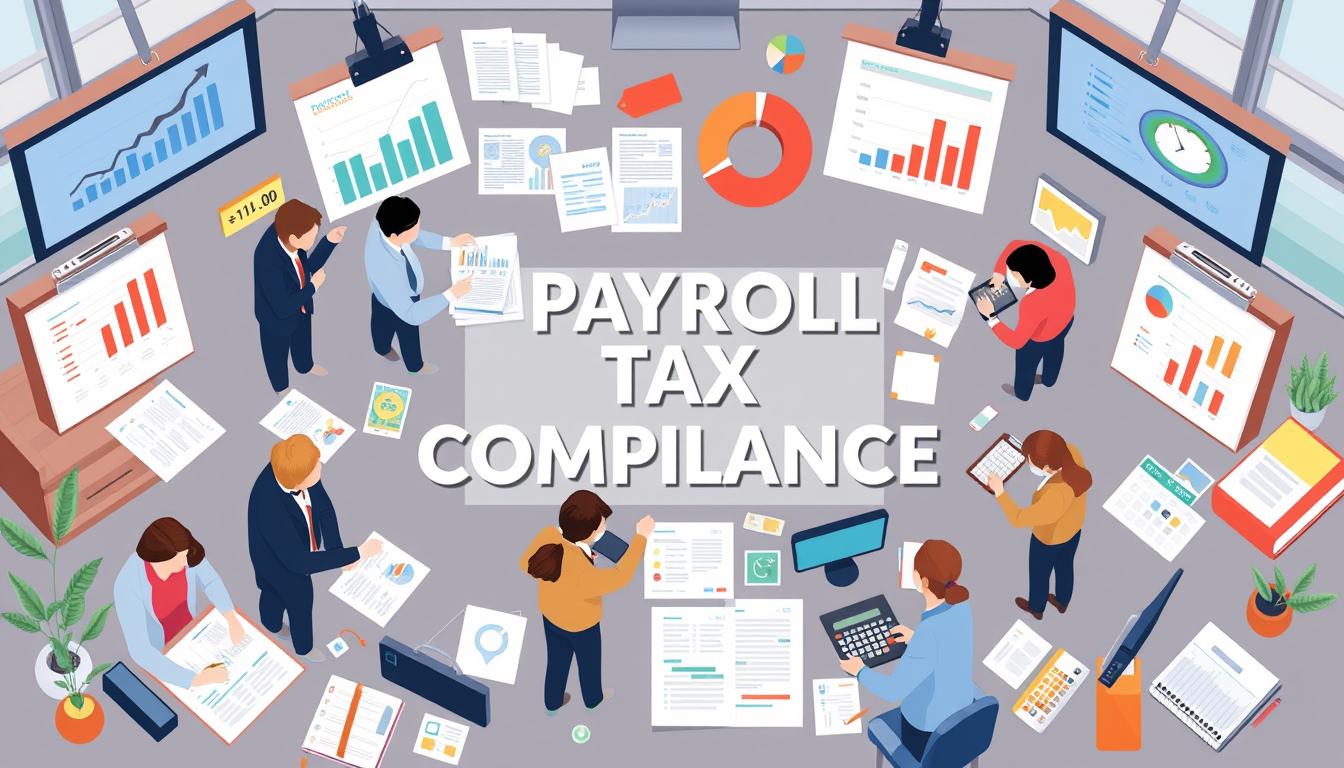Imagine standing on the edge of a precipice, looking down at a vast and complex landscape of corporate tax systems, intricate regulations, and ever-changing laws. It can feel overwhelming, can’t it? Every decision you make has the potential to either propel your business forward or send it spiraling into unforeseen complications. Finding clarity in this labyrinth is not just a matter of compliance; it’s an essential step toward financial stability and growth. The truth is, effective corporate tax planning allows you to uncover potential savings and make well-informed decisions that safeguard your company’s future. As deadlines loom and tax obligations grow, the urgent need to streamline your corporate tax strategy has never been more critical. By embracing proactive tax strategies, you can ensure your business navigates these complexities with confidence and resilience1.
In today’s landscape, staying informed about tax regulations and embracing technological solutions are vital for optimizing your approach. You don’t have to tackle these challenges alone; with the right tools and insights, achieving tax compliance and maximizing savings is well within reach23.
Key Takeaways
- Effective corporate tax planning is essential for growth and stability.
- Understanding and adapting to tax regulations can lead to significant savings.
- Utilizing technology can streamline processes and enhance compliance.
- Proactively managing your tax strategy helps to minimize risks.
- Collaboration among departments strengthens your tax management.
Understanding Corporate Tax Fundamentals
Corporate tax serves as a vital aspect of the American economic landscape. It represents a levy imposed on the income or profit of corporations, significantly affecting your overall financial management strategy.
What Is Corporate Tax?
Corporate tax applies to legal entities including C-corporations and, to some extent, S-corporations. In the United States, the corporate income tax rate stands at 21 percent, a substantial reduction from previous years where rates exceeded 35 percent45. This tax structure ensures that corporations contribute to public finances, as evidenced by the $424.7 billion raised in fiscal year 2022, which accounted for 8.7 percent of all federal revenue4.
Types of Corporate Taxes
Various types of corporate taxes exist, including:
- Income tax: Levied on a corporation’s earnings.
- Capital gains tax: Applied to profits from asset sales.
- Franchise taxes: Imposed for the privilege of doing business in a jurisdiction.
In the U.S., corporate tax revenues constituted only 1.7 percent of the nation’s GDP in 2022, significantly down from 4.2 percent witnessed during the 1950s and 1960s5.
How Taxes Impact Your Business Decisions
Understanding the tax implications of various decisions is essential for your business strategy. For example, the Tax Cuts and Jobs Act (TCJA) allows full expensing of most new investments through 2022, with a planned phase-out at 20 percent per year until 20274. Such provisions influence crucial factors like pricing strategies and investment planning. As a business owner, you might consider how these tax structures shape your operational strategies and overall financial health.

The Importance of Corporate Tax Planning
Understanding the significance of effective corporate tax planning is essential for your business’s financial health. Engaging in thorough planning can yield long-term benefits, including tax savings and enhanced cash flow. With corporate tax laws continuously evolving, staying informed becomes crucial for avoiding common tax pitfalls.
Long-Term Benefits of Tax Planning
Effective tax planning saves both time and money in the long run6. It allows you to optimize your tax liability through credits and deductions, liberating essential funds for reinvestment in your business6. By carefully analyzing your financial structure, you can enhance compliance with corporate tax laws and target strategic investments that facilitate growth.
Avoiding Common Tax Pitfalls
Recognizing common tax pitfalls is vital for safeguarding against costly mistakes. Issues such as missed deductions, incorrect tax filings, and late payments may incur penalties that negatively impact your business. Proper record-keeping encourages efficient filing, effectively avoiding unnecessary fees6. Additionally, leveraging available tax saving tips can minimize your tax burden and help you avoid the suspense surrounding compliance with current laws7.

| Common Tax Pitfalls | Consequences | Prevention Strategies |
|---|---|---|
| Missed Deductions | Higher Tax Liability | Regularly review eligible expenses |
| Filing Errors | Penalties and Fines | Implement a thorough review process |
| Late Payments | Interest and Additional Fees | Set reminders for tax deadlines |
| Poor Record-Keeping | Increased Filing Time and Cost | Maintain organized and accurate records |
By incorporating these practices, you position your business to benefit from effective tax strategies that can significantly reduce financial burdens.
Key Components of Corporate Tax Strategy
Crafting a successful corporate tax strategy involves various components that significantly impact your financial outcomes. Understanding tax deductions, tax compliance, and the appropriate business structure can enhance your efficiency and optimization in handling corporate tax.
Identifying Deductions and Credits
Recognizing the right tax deductions is critical for reducing your business’s taxable income. Common deductible expenses include rent, utilities, and various operational costs, enabling you to lower your overall tax liability efficiently. For instance, businesses can leverage accelerated depreciation methods to maximize tax benefits, while deductible employee contributions to health insurance and retirement plans offer additional areas for potential savings.
Tax Compliance and Filing Requirements
Staying informed about tax compliance and filing requirements is essential. U.S. corporate tax returns are typically due by the 15th day of the fourth month following the end of the corporation’s tax year8. Moreover, businesses must comply with state-level taxes, which can range from minimal to double-digit rates8. Understanding these requirements can prevent legal pitfalls and ensure timely submissions.
Choosing the Right Business Structure
Your choice of business structure can directly influence your tax responsibilities and overall liabilities. C corporations, for example, are subject to a federal corporate tax rate of 21%98. Additionally, operating as an LLC or an S-Corp may provide unique advantages regarding tax compliance and the management of deductions. Each structure has distinct implications for taxable income, allowing tailored strategies based on your business model.

| Business Structure | Federal Tax Rate | Advantages | Considerations |
|---|---|---|---|
| C Corporation | 21% | Unlimited growth potential; easier to attract investors | Subject to double taxation |
| S Corporation | Pass-through taxation | Tax benefits; owners avoid double taxation | Limited ownership; stricter operational processes |
| LLC | Varies by state | Flexible tax treatment; limited liability | Compliance requirements vary by state |
Implementing a comprehensive approach that includes recognizing deductions, adhering to tax compliance, and selecting the right business structure can position you favorably in the corporate tax landscape98.
Common Corporate Tax Misconceptions
Understanding corporate tax misconceptions is vital in paving the way for informed financial decisions. Many believe that all corporations are burdened with high tax rates. This is far from reality, as many companies pay significantly less due to various deductions and credits available to them. The average effective federal income tax rate among the largest corporations was only 21.2% between 2008 and 2015, with some, like General Electric and International Paper, paying zero federal income tax during this period10. This underscores the need to be aware of the realities of corporate taxation.
Debunking Myths About Corporate Tax Rates
One prevalent myth associates high tax rates with corporate profitability. It’s essential to note that the federal tax system is more progressive than other regions, meaning middle- and low-earners enjoy lower rates11. Additionally, well-designed tax cuts can stimulate economic activity, creating new taxable income opportunities. In fact, tax cuts need to lead to $5 in new economic activity for every $1 cut to be sustainable11. Consequently, many corporations effectively minimize their tax burdens, challenging the notion that all firms face high federal income taxes.
Understanding the Difference Between Tax Evasion and Avoidance
It’s crucial to differentiate between tax evasion and tax avoidance. Tax evasion is illegal and involves not reporting income or falsely deducting expenses. In contrast, tax avoidance uses legal methods, such as deductions and credits, to reduce taxable income. Misunderstandings around these terms can result in severe consequences for businesses. For example, many corporations managed to exploit tax breaks significantly, with just 25 companies claiming $286 billion in tax breaks from 2008 to 2015, while others paid nothing at all10. Grasping these concepts helps maintain ethical practices while optimizing your tax strategy.

Recent Changes in Corporate Tax Legislation
Changes in corporate tax laws can have profound tax implications for businesses, making it essential to stay updated on new regulations. Recent adjustments could affect your business operations, potentially leading to increased tax compliance complexities.
How New Laws Can Affect Your Business
The Tax Cuts and Jobs Act (TCJA) is set to expire on December 31, 2025, which may usher in significant changes for taxpayers12. Most corporations currently benefit from a corporate tax rate reduced from 35% to 21% under the TCJA, and discussions abound regarding increasing this rate12. Estimates suggest that the minimum tax could generate over $250 billion from the most profitable companies in the next decade, with $20 billion anticipated in 202513.
Keeping Up with Legislative Updates
It is advisable for companies to regularly model scenarios considering potential changes in corporate tax rates and other legislative updates14. Business leaders should remain proactive, revisiting advocacy plans to protect company interests amid shifting tax laws14. Understanding the possibility of increased taxes can lead companies to accelerate income and defer deductions to effectively manage their tax implications14.

| Potential Tax Changes | Expected Impact |
|---|---|
| Expiration of TCJA Provisions | Increased tax rates for corporations |
| Introduction of Minimum Tax | Ensures large corporations pay at least 15% on profits |
| Advocacy for Extension of Tax Cuts | Potential for new proposals impacting overall tax structure |
The Role of Tax Professionals
In the world of corporate tax, tax professionals serve as essential guides through the complex landscape of tax law and compliance. Their expertise can significantly influence your financial outcomes.
Benefits of Hiring a Tax Advisor
Engaging a tax advisor brings numerous advantages, including enhanced compliance and overall tax liability reduction. Studies show that tax preparers earn an average of nearly $180 per hour and the Bureau of Labor Statistics reported that the average annual salary for tax preparers was $49,550 as of May 202315. More than half of taxpayers claiming refundable credits, such as the Earned Income Tax Credit, depend on paid tax professionals for accurate filings16. This reliance underscores the value of professional guidance in navigating corporate tax requirements.
When to Consult with a Tax Professional
Understanding when to consult a tax professional is crucial for maximizing your benefits. Consider reaching out during significant financial transitions, like mergers or acquisitions, or when major tax law changes affect corporate tax obligations. Internal tax departments are predicted to take more aggressive stances on tax positions than those prepared by external auditors17. Therefore, timely consultations can help mitigate risks associated with complex tax matters.
Understanding Tax Preparation Costs
Tax preparation costs can vary widely, influenced by the size and complexity of your business. Sample firms spent over $815 million on tax-related work with their auditors in just two years17. Recognizing these costs will facilitate effective budgeting for your corporate tax strategy. Active Preparer Tax Identification Numbers (PTINs) are required for all compensated tax preparers, emphasizing the seriousness of maintaining professionalism in tax consulting16.

Leveraging Technology for Tax Management
In today’s rapidly evolving business environment, adopting technology in tax strategies becomes essential for enhancing tax compliance and management. Utilizing tax management software is not just about automating processes; it’s about transforming how your organization approaches tax obligations.
Tools and Software for Corporate Tax
Numerous tax preparation software options, such as TurboTax and H&R Block, cater to different business needs, each providing unique features designed to streamline the tax filing process18. Furthermore, accounting software like QuickBooks and Xero integrates tax compliance with financial management, which helps ensure that businesses accurately track expenses and manage invoices18. Payroll systems, including ADP and Paychex, automatically handle payroll taxes, promoting adherence to employment laws and reducing manual errors18.
Streamlining Your Tax Processes
The incorporation of cloud-based tax compliance platforms, such as Avalara and Thomson Reuters ONESOURCE, delivers sophisticated solutions for dealing with sales tax, VAT, and corporate income tax while ensuring high data security and accessibility18. Data analytics tools like Tableau allow businesses to visualize financial data, enabling them to identify tax-saving opportunities and anticipate future tax liabilities18. By embracing digital solutions, 90% of respondents noted progress toward streamlining tax processes, with many expecting significant advancements in AI’s role in tax compliance over the next few years19. The benefits of digital and AI technologies are evident, with 34% of respondents citing improved accuracy and 23% highlighting reduced costs as key advantages19.

Best practices for utilizing tax technology include ensuring regular updates and training, integrating and customizing software, prioritizing security features, and consulting professionals for the best tools to meet your specific needs18. As the landscape evolves, understanding that 41% of governments are contemplating regulatory options for GenAI and digital tax administration, ensures that businesses stay ahead of the curve19. By leveraging technology effectively, you can significantly enhance your organization’s tax compliance and operational efficiency.
Strategies for Reducing Your Corporate Tax Burden
Reducing your corporate tax burden involves strategic planning and informed decisions. By exploring various tax incentives and effectively managing your timing of income and expenses, you can maximize your tax saving tips. Understanding these strategies can help you keep more of your hard-earned revenue while ensuring compliance with tax regulations.
Exploring Tax Incentives and Benefits
Tax incentives provide significant opportunities for companies looking to lower their corporate tax obligations. Strategic tax planning can result in a reduction of overall tax burden by effectively managing income, expenses, and investments, which can enhance after-tax cash flows20. For instance, companies can capitalize on deductions related to research and development expenses, a government initiative designed to drive innovation and growth20. In 2023, tax credits for research activities are projected to cost the government nearly $25 billion, with expectations to rise to almost $40 billion by 203221. This illustrates the potential benefits of aligning your business activities with the available tax incentives.
Timing Your Income and Expenses
Effective timing of your income and expenses can play a crucial role in managing your corporate tax liabilities. By ensuring adherence to the rules surrounding net operating losses, you can carry over losses from previous years to offset future taxable income, which can be particularly advantageous if you find your company facing high revenues21. Also, accelerated depreciation methods allow for larger deductions in the early years of an asset’s life21. Owners of pass-through entities should be mindful to pay at least 90% of their tax for the year to avoid penalties, and estimated taxes for these entities typically depend on prior year income22. Integrating these practices into your financial strategy can lead not only to tax savings but also to improved cash flow management.

Preparing for Corporate Tax Audits
Understanding the audit process can significantly help your business mitigate risks associated with tax audits. It is essential to know what to expect, including documentation requests and interviews. Keeping your records well-organized aids in ensuring tax compliance with corporate tax regulations.
What to Expect During an Audit
During a tax audit, you may face various forms of scrutiny. The IRS can conduct business tax audits via mail, office audits, and field audits. Factors such as high income returns or consistently reporting business losses can trigger these audits23. In fact, in November 2020, the IRS announced a 50% increase in audits of small businesses, highlighting the importance of being prepared24. Furthermore, certain financial practices like excessive business deductions or misclassifying employees can raise red flags for auditors23.
How to Optimize Your Records
Optimizing your record-keeping practices is key to managing the audit process effectively. Keeping tax-related documents organized for two to six years usually suffices for small business tax requirements24. Ensure you gather essential documents such as bank statements, books and records, and daily logs before an audit23. You may also want to review relevant Audit Technique Guides (ATG) and consult a tax professional for additional insights23.

Navigating International Corporate Tax Landscape
For businesses expanding their operations internationally, understanding the complexities of international corporate tax is paramount. Different jurisdictions have unique tax obligations that can significantly affect your bottom line. This creates a pressing need for thorough tax compliance, particularly when dealing with cross-border transactions.
Understanding Global Tax Obligations
Global tax obligations vary widely from one country to another. The Federal Tax Authority (FTA) Decision No. 3 of 2024 sets forth deadlines for registration based on when businesses receive their license. For example, companies licensed between January 1 and January 31 must register by May 31, 202425. Additionally, licenses issued from March to August will have staggered deadlines extending from June 30 to October 31, 202425. Organizations established after the effective date have a three-month period for registration, making early preparation crucial.
Cross-Border Tax Considerations
Engaging in cross-border transactions introduces challenges such as transfer pricing and the risk of double taxation. Businesses need to actively monitor their tax compliance situation to navigate these complexities effectively. Corporate tax currently stands at 21%, but potential increases to 28% could significantly change tax strategies26. Additionally, a notable 70% of respondents in a Global Tax Outlook survey highlighted heightened tax authority scrutiny as a considerable challenge27. Investing in technology that integrates accounting and tax software can streamline compliance and reporting efforts, making it easier to adapt to changing regulations.

The Impact of Corporate Tax on Business Growth
Your corporate tax strategy plays a vital role in shaping business growth. Understanding the corporate tax impact can help you align tax strategies with your overall business objectives. As you refine your tax plans, you may notice significant correlations between tax policies and the potential for expanding your operations.
Linking Tax Strategy to Business Objectives
Effective tax strategies can lead to improved investment opportunities and operational efficiencies. When businesses optimize their tax plans, they often experience an increase in local firms, correlating with overall economic growth. Studies show that tax cuts lead to heightened employment levels, wage increases, and rising rents as firms scout areas with more favorable tax conditions28. Additionally, owners of firms typically reap substantial rewards from corporate tax reductions, absorbing around 50% of the benefits, while employees and landowners share the remainder28.
Corporate Tax and Investor Confidence
Investor confidence is closely linked to how well a company manages its tax obligations. The Tax Cuts and Jobs Act (TCJA) has led to a reduction in the federal corporate tax rate from 35% to 21%, enabling businesses to retain more earnings for reinvestment29. Although the U.S. corporate tax rate remains moderately high compared to OECD averages, this reduction has positively influenced investor sentiments towards U.S. companies29.
Furthermore, proposed increases in corporate tax rates may pose challenges for businesses and potentially reduce attractiveness for investors as they could result in higher costs that are passed onto consumers, thereby affecting profitability29. The dynamics of corporate tax strategies create a ripple effect, impacting everything from wages to shareholder returns.

Planning for Future Corporate Tax Changes
Businesses today must stay proactive in navigating the evolving terrain of corporate tax laws. Staying ahead of legislative changes is crucial for effective tax planning and ensures a competitive edge when formulating a future tax strategy. By anticipating potential adjustments, you can minimize disruptions and enhance your tax efficiency.
Anticipating Legislative Shifts
Legislative shifts can dramatically alter corporate tax obligations. For instance, the corporate tax rate currently stands at a flat rate of 21%30. Moreover, significant changes to the treatment of R&D expenses have been put in place, moving towards a model that requires capitalization and amortization over five years instead of immediate deductions30. The GILTI tax rate is scheduled to increase from 10.5% to 13.125% in 2026, impacting strategic international operations30. Awareness of such developments allows companies to adjust their financial planning accordingly, ensuring alignment with ongoing compliance. Additionally, understanding trends projected from proposals, such as a long-run GDP increase of +0.8%, can help frame realistic expectations for growth amid changes31.
Developing a Flexible Tax Strategy
A flexible tax strategy is key to absorbing the impacts of corporate tax changes. Companies should prioritize adaptability in their financial frameworks, ensuring they can pivot quickly as new laws are enforced. The potential phase-out of the SALT Cap by a $10,000 cap on state and local tax deductions can influence budgeting strategies30. To prepare effectively, businesses can integrate the Qualified Business Income Deduction, allowing eligible owners of pass-through businesses to deduct up to 20% of their qualified business income, maximizing tax benefits already available30. Establishing ongoing dialogues with tax professionals will boost awareness and foster strategic adaptation tailored to your specific business needs. Flexibility will empower your organization to capitalize on the evolving landscape, ensuring sustained compliance and financial efficiency.

Resources for Staying Informed on Corporate Tax
Understanding current corporate tax resources is vital for maintaining tax compliance and optimizing your tax strategy. Utilizing reputable reading materials, websites, and joining professional tax organizations can significantly enhance your knowledge and keep you informed about crucial developments in the field.
Recommended Reading and Websites
Several platforms provide extensive corporate tax resources that can guide you through complex tax landscapes. Tax Notes is an excellent resource that offers a comprehensive suite of tax resources tailored for various roles and industries. They also feature the Tax History Project, compiling an archive of presidential tax returns available for public access32. Tax Analysts actively engages in FOIA litigation to champion the public interest in tax policy, ensuring you stay informed about the implications of tax legislation32. Their selection of tax news is best-in-class, curated by dedicated editors who provide insights on recent developments32.
Joining Professional Organizations
Participating in professional tax organizations connects you with experts in the field and provides resources that enhance your approach to tax compliance. According to a State of the Tax Professionals Report from Thomson Reuters, 66% of respondents indicated that clients prefer receiving comprehensive business advice from their tax professionals33. This highlights the value of continuous education and networking with industry peers.
Consider organizations that not only offer educational resources but also present opportunities for interaction, such as webinars and podcasts. Tax Notes, for instance, features a weekly podcast called Tax Notes Talk and a series of webinars focusing on cutting-edge tax policy issues32. Utilizing advanced AI-powered research tools like Checkpoint Edge can further streamline your tax research, keeping you updated with the latest tax law changes33.

Conclusion: Start Streamlining Your Corporate Tax Strategy Today
As you consider the future of your business, it’s imperative to take action on improving your corporate tax strategies. Engaging in proactive tax management will not only enhance your compliance but can also foster long-term success and financial health. Various corporate structures, like S corporations, LLCs, and C corporations, each have their unique tax implications that may affect your bottom line; selecting the right one is crucial for effective business taxes and will ultimately lead to a more favorable tax future34. Tax credits and incentives can also prove invaluable; when utilized properly, they can significantly lower your tax burden and contribute to better cash flow34.
Taking Action for a Better Tax Future
Now is the time to prioritize your tax strategies, especially in light of evolving legislation and increased demand for transparency in financial operations35. By implementing advanced tax functions early, you may considerably reduce your effective tax rate while increasing cash flow, empowering your business operations to thrive35. Given the growing focus on technology solutions in tax management, ensure you leverage the right tools and maintain accurate records, as they are essential for navigating the complexities of business taxes36.
Final Thoughts on Corporate Tax Strategy
In summary, corporate tax planning is a continuous process that necessitates your commitment to adapt and innovate. Understanding tax incentives, staying informed on international obligations, and embracing technology will help you stay ahead in today’s business landscape. As you refine your corporate tax strategies, take the opportunity to build a framework that ensures not only compliance but a pathway to sustained growth343536.
FAQ
What is corporate tax?
What types of corporate taxes should I be aware of?
How do corporate taxes impact my business decisions?
Why is corporate tax planning important?
What are common tax planning pitfalls I should avoid?
How can I identify applicable tax deductions and credits?
What differences exist between tax evasion and tax avoidance?
How do recent changes in tax laws affect my business?
When should I consider hiring a tax advisor?
How can technology aid my corporate tax management?
What strategies can I employ to reduce my corporate tax burden?
What should I expect during a corporate tax audit?
How do international tax obligations work for my business?
How can corporate tax strategy influence business growth?
What steps can I take to stay informed about future tax changes?
What resources are available for staying informed on corporate tax?
Source Links
- https://controllerscouncil.org/best-practices-for-streamlining-corporate-tax-compliance/ – Best Practices for Streamlining Corporate Tax Compliance – Controllers Council
- https://www.wolterskluwer.com/en/expert-insights/modernising-the-corporate-tax-function – Modernising the corporate tax function – technology insights
- https://www.linkedin.com/pulse/streamlining-tax-filing-best-practices-seamless-compliance – Streamlining Tax Filing: Best Practices for Seamless Compliance
- https://taxpolicycenter.org/briefing-book/how-does-corporate-income-tax-work – How does the corporate income tax work?
- https://pgpf.org/article/the-us-corporate-tax-system-explained/ – The U.S. Corporate Tax System Explained
- https://deleonandstang.com/insights/tax-planning-importance – Why Tax Planning Is Important — DeLeon & Stang
- https://www.finanshels.com/blog/corporate-tax-planning-for-profitability – The Importance of Corporate Tax Planning in Maximising Profitability | Finanshels Resources
- https://www.investopedia.com/terms/c/corporatetax.asp – Corporate Tax: Definition, Deductions, How It Works
- https://www.hco.com/insights/business-tax-planning-strategies – Corporate Tax Planning Strategies
- https://itep.org/the-35-percent-corporate-tax-myth/ – The 35 Percent Corporate Tax Myth
- https://manhattan.institute/article/correcting-the-top-10-tax-myths – Correcting the Top 10 Tax Myths
- https://www.plantemoran.com/explore-our-thinking/insight/2024/11/2025-tax-legislation-the-future-of-business-tax – 2025 tax legislation: The future of business tax | Our Insights | Plante Moran
- https://home.treasury.gov/news/press-releases/jy2574 – U.S. Department of the Treasury Releases Proposed Rules for Corporate Alternative Minimum Tax to Address Significant Corporate Tax Avoidance By Companies with $1 Billion Or More In Annual Profit
- https://www.ey.com/en_us/insights/tax/steps-to-take-now-to-prepare-for-tax-legislation-in-2025 – Steps to take now to prepare for tax legislation in 2025
- https://www.accounting.com/careers/tax-preparer/ – What Do Tax Preparers Do? | Accounting.com
- https://www.eitc.irs.gov/tax-preparer-toolkit/tax-professional-awareness-week – Tax Professional Awareness Week | Earned Income Tax Credit
- https://www.irs.gov/pub/irs-soi/12resconcorptaxcomp.pdf – PDF
- https://www.linkedin.com/pulse/leveraging-technology-era-corporate-tax-tools-wahaj-siddiqui-bj7uf – Leveraging Technology in the Era of Corporate Tax: Tools for Efficient Compliance
- https://www.cpapracticeadvisor.com/2024/10/09/the-future-of-tax-how-corporations-can-leverage-new-technology-when-im-talking-im-also-typin/151815/ – The Future of Tax: How Corporations Can Leverage New Technology for Tax Efficiency
- https://msaonline.depaul.edu/blog/strategic-tax-planning – Strategic Tax Planning: Essential Tips for Corporate Tax Efficiency
- https://usafacts.org/articles/how-can-corporations-avoid-paying-taxes/ – How do corporations avoid paying taxes? | USAFacts
- https://www.ml.com/articles/tax-tips-for-small-business-owners.html – Tax Tips and Strategies for Small Business Owners
- https://www.waveapps.com/blog/how-to-prepare-for-a-business-tax-audit – How to prepare for a business tax audit
- https://www.thehartford.com/business-insurance/strategy/preparing-for-audit – Preparing for a Small Business IRS Audit
- https://www.linkedin.com/pulse/navigating-new-corporate-tax-landscape-guide-emerging-gareth-jones-josmf – Navigating the New Corporate Tax Landscape: A Guide for Emerging Entrepreneurs
- https://blog.becpas.com/navigating-the-future-of-tax-policy-a-guide-for-corporate-boards – Navigating the Future of Tax Policy: A Guide for Corporate Boards
- https://www.taxadvisermagazine.com/article/navigating-tax-landscape-challenges-2024 – Navigating the tax landscape: the challenges for 2024
- https://www.nber.org/reporter/2023number3/how-do-corporate-taxes-affect-economic-activity – How Do Corporate Taxes Affect Economic Activity?
- https://www.uschamber.com/taxes/how-higher-corporate-tax-rates-would-affect-your-local-economy – How Higher Corporate Taxes Would Affect Your Local Economy
- https://www.smith-howard.com/understanding-potential-tax-changes-for-businesses-and-their-owners-preparing-for-2025/ – Understanding Potential Tax Changes for Businesses and Their Owners: Preparing for 2025 – Smith and Howard
- https://taxfoundation.org/research/all/federal/donald-trump-tax-plan-2024/ – Trump’s Tax and Tariff Ideas: Details & Analysis
- https://www.taxnotes.com/free-resources – Free Tax Resources (News, Analysis & Reports)
- https://tax.thomsonreuters.com/blog/how-to-keep-up-with-tax-law-changes/ – How to keep up with tax law changes
- https://www.dominion.com/tax/corporate-tax-services – Corporate Tax Services: Key Considerations for Growing Companies | Dominion
- https://www.cfo.com/news/why-tax-planning-should-be-melded-with-strategy/662751/ – Why Tax Planning Should Be Melded with Strategy
- https://www.pwc.com/gx/en/tax/publications/assets/enhancing-tax-process-managemnt-and-controls.pdf – Enhancing tax process management and controls









